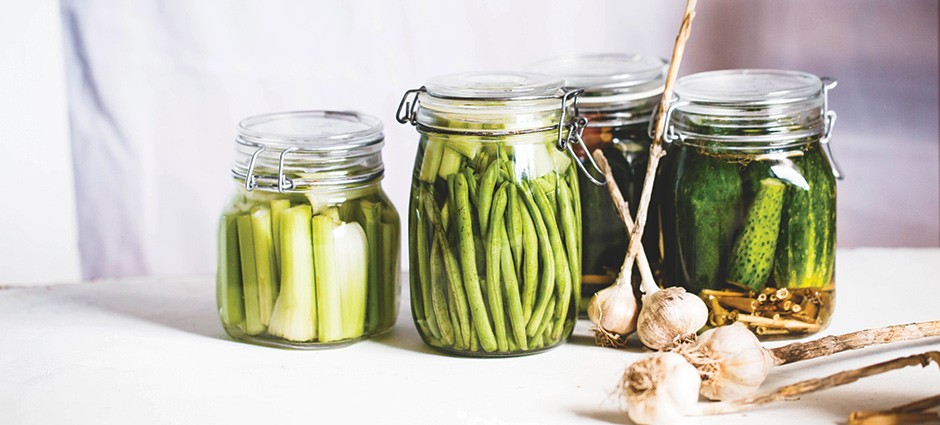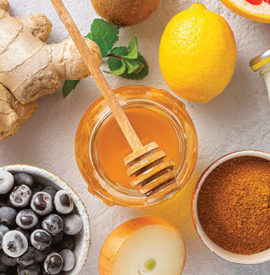Experts weigh in on the best nutritional supplements to keep you and your family healthy this fall and beyond.
Autumn is a time to pull out the wool sweaters, cozy up with family and sip warm drinks instead of cold. For some of us, though, it’s also the time for runny noses, plummeting energy levels and even the blues. During this seasonal transition, eating well and exercising may not be enough to keep you feeling and performing at your best. Here, we look at four common health complaints during the fall and winter and provide expert recommendations for nutritional supplements that can fill the gap.
Immunity
Often no sooner do the leaves start changing than noses start running. It’s not a big surprise that in fall and early winter there’s a spike in illness, according to Carolyn Dean, M.D., N.D. and author of more than 30 books on health and wellness. “Fall is our busiest time; we go back to school, and in business we have to make up for the summer slacking,” she says. “We burn the candle at both ends. Add in the cooler months with people gathering indoors where germs are more readily shared and you get more colds, flus and fatigue.”
One key to staying healthy is gut health, according to Paul Dell’Aquila, M.D., with RWJ Barnabas Health of New Jersey. This may surprise some but makes sense when you consider that 80 percent of your immune system is located in your digestive tract. In addition to a daily probiotic with at least 1 billion CFU of active ingredients (or live bacteria), he suggests vitamin D, omega-3 fish oil and a high-potency multivitamin to boost immunity.
To keep kids healthy, Dean emphasizes avoiding sugar, which can compromise young immune systems, and he suggests that kids take a daily children’s multivitamin.
Allergies
Allergies are usually associated with springtime when everything is blooming, but fall also triggers allergies for many people. Dying leaves and plants release allergic substances and, when wet, can emit mold spores, according to Dell’Aquila.
Dell’Aquila suggests easing allergy symptoms by treating the cause: inflammation. The following supplements are all proven to reduce the body’s inflammatory response: quercetin (a flavonoid found in plants), aged-garlic (a supplement, not old garlic), ginger and even wasabi (the supplement form, not the paste) can be used.
Low Energy
Fall’s waning daylight decreases not only our vitamin D but also your melatonin levels. Too little melatonin can disturb your sleep cycle and ultimately lead to fatigue, says Dell’Aquila. Additionally, people tend to rev up in the fall with holiday activities and parenting responsibilities that can leave them feeling worn out.
Dell’Aquila advises starting with diet for increased energy. “Multiple small meals of good protein, complex carbohydrates and good fats are a great way to improve energy and feel great. A diet high in simple sugars will cause a spike first in your blood sugar and then insulin, causing the common post-lunch crash that many people experience,” he says.
In addition to eating right, he suggests a high-potency multivitamin and supplements coenzyme Q10, L-carnitine, gingko biloba, arginine and D-ribose, which are associated with increasing energy. One caveat: Consult with a health practitioner familiar with these supplements before taking them.
Dean turns to magnesium for energy. “Magnesium is a requirement for six of the 10 chemical steps in making adenosine triphosphate (ATP), the energy currency of the body. Without magnesium you don’t have energy. Also magnesium relaxes muscles so you are no longer tense or tired from being tense. It helps you sleep deeply, so you are more rested and therefore have more energy. You can take Epsom salt baths (2 cups in a hot bath) or take magnesium citrate powder as a tea,” she says.
Mood
For many people fall brings mood changes like the blues. One likely culprit is, again, decreased daylight resulting in lower levels of vitamin D, which effects serotonin function that’s key in regulating your mood. In addition to vitamin D, Dell’Aquila recommends 5-HTP for anyone who isn’t taking an antidepressant. It helps to increase serotonin levels. A B-complex is important, as the B vitamins help produce neurotransmitters in our bodies. Magnesium can ease anxiety.









Comments
Hey Anna, do you have any experience with kratom as an energy/mood supplement? I’ve been hearing about it more and more. He’s not the only one, but I have a friend who gets his kratom from this site (https://goldenmonk.com) and swears by the stuff. He says as long as you don’t take too much, it’s a good time like coffee but without the nervous energy.
Mood changes in fall are hitting me hard. Vitamin D and B-complex for serotonin production seem promising. Fellow psychology students, how are you dealing with these seasonal mood shifts? Let’s share tips! Also, a B Complex supplement has contributed to maintaining my focus during study sessions.